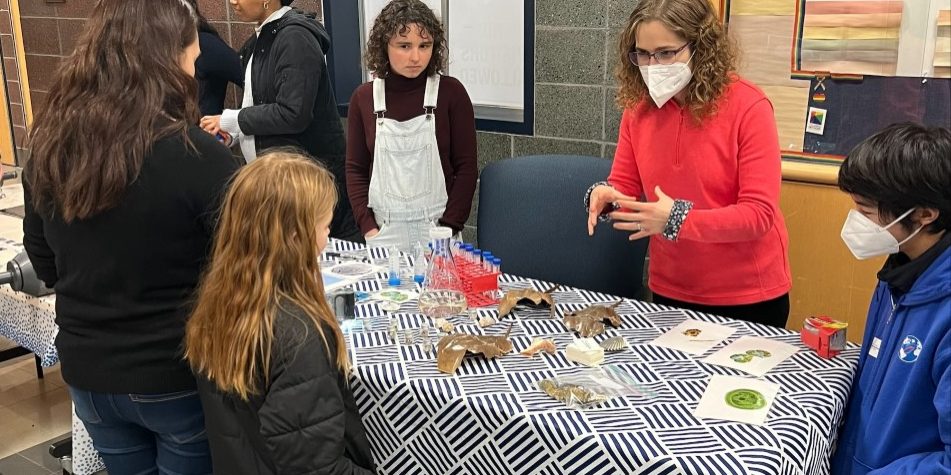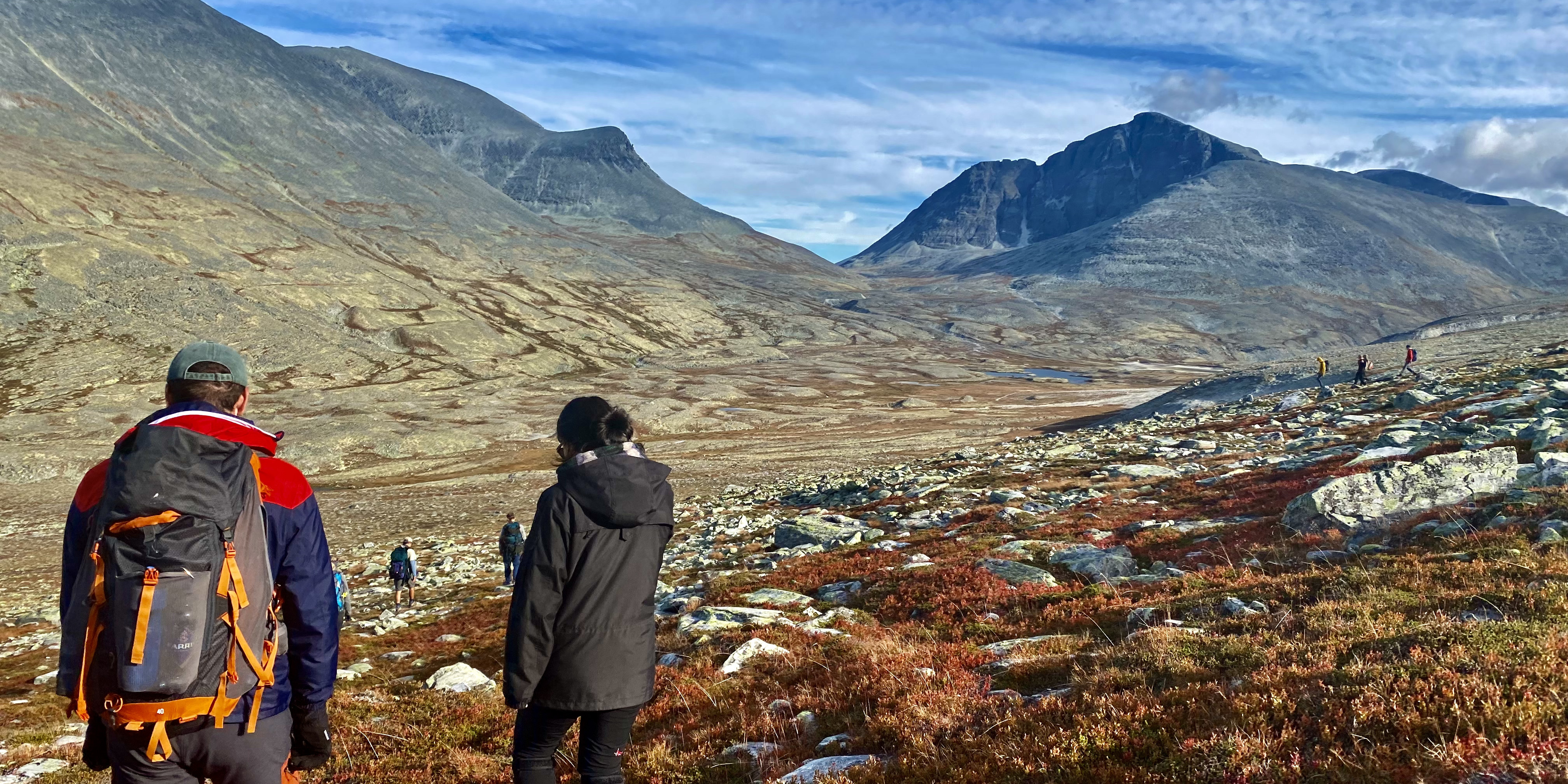

Introduction
So you’re in graduate school, and you’re spending untold hours poring over way-too-specific textbooks, grumbling about the quality control on the dataset someone sent you, and hiding the last box of Kimwipes from the rest of your lab. But isn’t there more to this whole experience? Everyone applies to graduate school for different reasons, and everyone walks out of it with different experiences. Broadening your horizons beyond the world of “your research” can be fulfilling, educational, and help you form professional connections.
In this article, we’ll discuss an assortment of activities that Joint Program (JP) students participate in that fall beyond the veil of what might traditionally be considered research. You’ll note an incredible amount of diversity in these activities, underscoring the opportunities for personalization in a graduate degree.

BIG outreach event. Photo credit to Arianna Krinos.
Outreach
It might be hard to explain your thesis to your great-aunt, but explaining climate sensitivity to a fourth-grader can be a good warmup. “Outreach” is a broad term, usually referring to events that give you a chance to engage with the general public on scientific matters. Departments, committees, and student organizations sometimes offer opportunities to participate in activities such as teaching in a classroom for a day, assisting with visiting school groups, or tabling at an event for the general public. For instance, scientific institutions in Woods Hole host the Woods Hole Science Stroll, an event designed to introduce Cape Cod vacationers to the plethora of marine science expertise in the area. These types of events allow scientists to practice their science communication skills and spread awareness of their research to the general public. If the thought of talking to tourists for the day phases you, independent organizations, like Letters to a Pre-Scientist, offer low-commitment opportunities that don’t involve being on your feet all day on a Saturday. These types of opportunities give you the chance to hone your communication skills, spread your research to a new population, and inspire the next generation.
Serena Sung-Clarke, a JP student in Biological Oceanography, helps run the Broader Impacts Group (BIG) along with JP student Arianna Krinos. BIG is a student initiative that seeks to “expand the distribution of fundamental research and scientific expertise to the realms of policy, environmental sustainability, science communication, and education.” Before graduate school, Serena worked as an EPA contractor, where the interaction between science and its communication was clearly on display.
“I came at it [BIG] not really thinking about outreach, but more about the role of scientists as people who can influence decisions,” Serena said. “A lot of times, as graduate students we put our noses down and research, but it’s important to engage with the implications of our research.”
Serena also stressed that while “outreach” often implies K-12 teaching opportunities, it spans a much broader field than that. Communication can occur in many different types of media, and BIG aims to support students in engaging in all of them. With so much diversity in communication forms (oral, written, video, etc.), there’s something for everyone in the world of outreach.
Teaching Opportunities
Whether an academic teaching career has always been your dream or you’re still deciding, getting teaching experience during graduate school can be a deeply rewarding pursuit. One JP Chemical Oceanography student, Danielle Haas Freeman, is an MIT Teaching Development Fellow, which means she is funded to organize events and develop resources that support graduate students who want to learn how to be better teachers. “When I came to grad school, I always wanted to have an academic teaching career. Sometimes we don’t get training in teaching along the way, which is a little paradoxical,” Danielle said. “For me, it’s been really positive to participate in teaching training programs, from full semester long classes (plan a syllabus, how to write a teaching statement), and also at the same time participating in practical teaching opportunities (guest lessons for undergrad or K-12).”
Your time in graduate school can present many chances to hone your teaching skills, with a wide range of commitment levels depending on your interest and schedule. These may include mentoring an undergrad, showing up to K-12 outreach events like science fairs, or TA’ing a graduate or undergraduate course. One of Danielle’s projects as a Teaching Development Fellow has been to curate a website for Joint Program students with an assembled list of teaching-related contacts and resources to facilitate participation in teaching opportunities. Danielle noted, “Even if you don’t end up wanting to do faculty teaching in the end, prioritizing teaching is important because, whatever job you end up in, you’ll be doing mentoring. If you want to create a positive work environment and help people succeed, having training in teaching and philosophy of teaching can be very helpful.”
Learning to teach is rarely wasted time: no matter what career you choose after graduate school, you will need to approach difficult situations with people who are learning skills for the first time. This doesn’t always mean, though, that your graduate program will prioritize it by default. Danielle advises, “If teaching is something you’re interested in, it’s ok to make it a priority because you might have to be really proactive. A lot of us go to grad school because we want the training to be faculty, but the training we get is in research, not teaching skills. You may need to have conversations with your advisor to make it explicit that you want to do this, and to discuss how much time is reasonable to spend on it.”
Climate Policy at COP
Many graduate students, especially in climate and geosciences, go into this field at least partly because we want to have an impact on the world outside academia. One route that some students take toward accomplishing this is to engage with climate policy. Opportunities to do so can come from events organized through your program, through professional societies or through classes at your institution. In Fall 2022, a WHOI seminar brought a group of 10 students to the United Nations Climate Change Conference, otherwise known as the Conference of the Parties of the United Nations Framework Convention on Climate Change, or more simply, COP. This conference has met annually since 1992 and its delegates seek to “stabilize greenhouse gas concentrations in the atmosphere at a level that would prevent dangerous anthropogenic interference with the climate system,” as agreed in the 1992 convention (United Nations Climate Change, n.d.). COP27, the 2022 conference, was held in Sharm El Sheikh, Egypt, and was attended by about 50,000 people from around the world. The meeting hosted world leaders, as well as delegations from the private sector, NGOs, scientific organizations, and more. Topics included climate technology, land use, gender and climate change, action for climate empowerment, as well as adaptation and resilience.
Attending COP27 gave students the opportunity to learn first-hand about the process of international climate negotiations, to network with people in industry, academia, NGOs, and government, and to present our own work in an international setting. One aspect of the conference that had the biggest impact on me (Cora) was the chance to listen to Indigenous leaders from around the world advocate for their interests and speak about how climate change and climate policy are affecting their communities. I and many of the other student attendees appreciated hearing directly from international perspectives and voices such as these that would otherwise not be so accessible.
The 2022 WHOI delegation was part of the first-ever Ocean Pavilion at COP, a hub for individuals and organizations interested in studying and protecting the ocean, as well as leveraging it in the fight against climate change. Due to the success of this year’s participation, WHOI plans to involve staff and students in future COPs as well, starting with COP28, which will be held in Dubai, UAE.

Photograph of a hike during the ACDC course. Photo credit to Glenn Liu.
Short Courses
Classes - love ‘em or hate ‘em, you probably have to take ‘em.
But imagine if you could take a class, in your field, with graduate students and instructors from around the world? Enter the “short course,” the informal term for a, usually full-time, usually 1-3 week-long, usually in the summer, course.
Glenn Liu, a JP student in Physical Oceanography, attended the Advanced Climate Dynamics Course (ACDC) in Norway in 2022. The course has an annually rotating topic, and covered “Dynamics of the Hydrological Cycle,” which was both relevant to Glenn’s research, and an area he wanted to expand upon. “I met a lot of people from international universities who I wouldn’t have otherwise met,” Glenn reported, “and if you’re super motivated, you can talk to the faculty, learn of new research directions, and possibly start collaborations.” The course content also introduced Glenn to things he wouldn’t have otherwise encountered. “I have a lot more suspicion about model components, like vegetation and how it’s represented. Here [at WHOI] we focus mostly on the ocean and atmosphere, and you never think about that.” Glenn also mentioned that many of these courses offer scholarships, and you can sometimes get full coverage to attend.
Alan Gaul, another Physical Oceanography student, attended Karthaus, a short course in Northern Italy (although Alan was a virtual attendee). Similarly to ACDC, Karthaus rotates their topic each year; the 2022 topic being dynamics occurring at the interfaces of two phases of matter, such as a solid and an aqueous solution. “It was pretty related to my research, but definitely a hard step to the right” Alan commented, “But it was good exposure and an in-depth view from people who know what they’re talking about.”
Short courses exist in many fields, and can be quite specific. Oftentimes, talking to faculty or postdocs can be a good resource to learn more about them, and learn whether or not one exists that might be a good fit for you.
Conclusion
With so many milestones in the path to a graduate degree, it can often feel like things that aren’t “your research” are less important. But graduate school is a journey to an often unclear destination, and the things you do that aren’t “your research” can help clarify that destination, whether that’s by helping you discover passion for a career path you didn’t know existed, or by adding something fulfilling to a career you already knew about.
References
What is the United Nations Framework Convention on Climate Change? United Nations Climate Change. https://unfccc.int/process-and-meetings/what-is-the-united-nations-framework-convention-on-climate-change
Read more of Through the Porthole Issue #9
Learn more about Through the Porthole
Learn more about the MIT-WHOI Joint Program